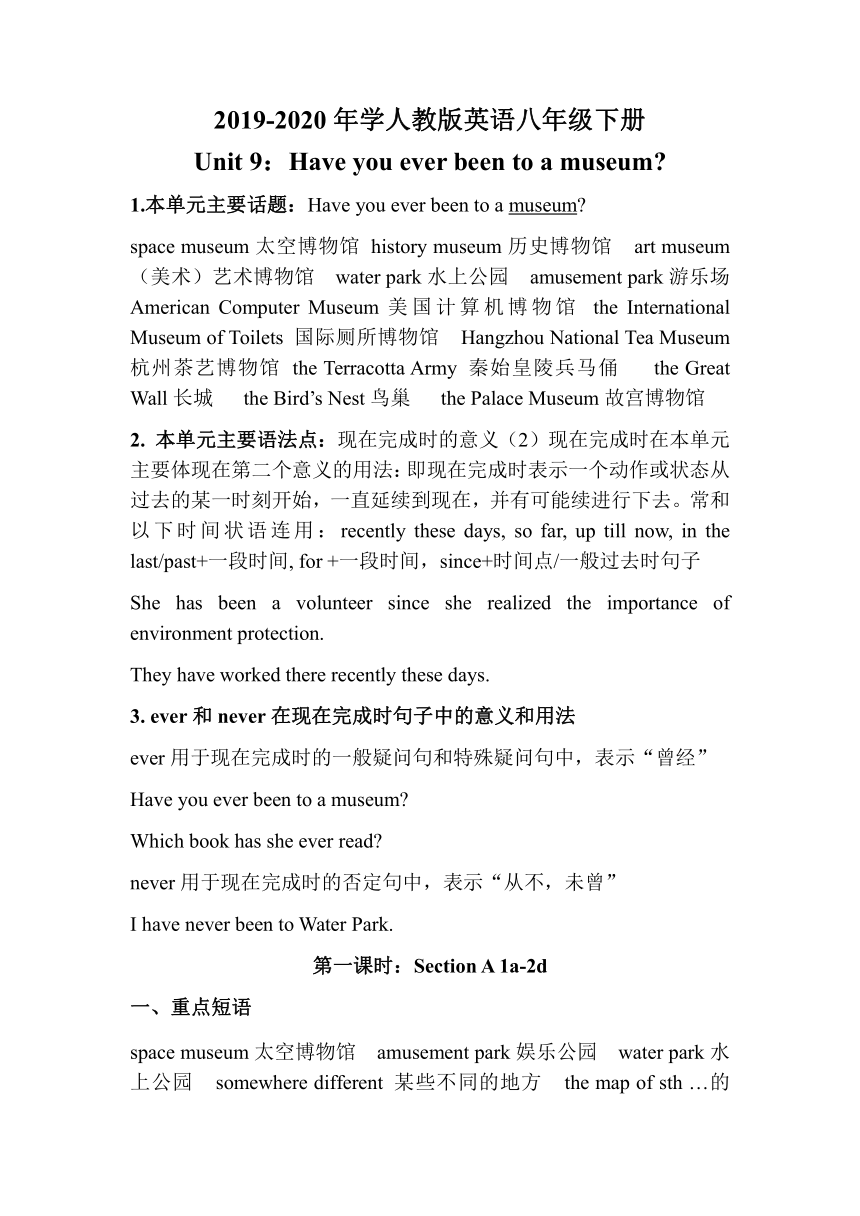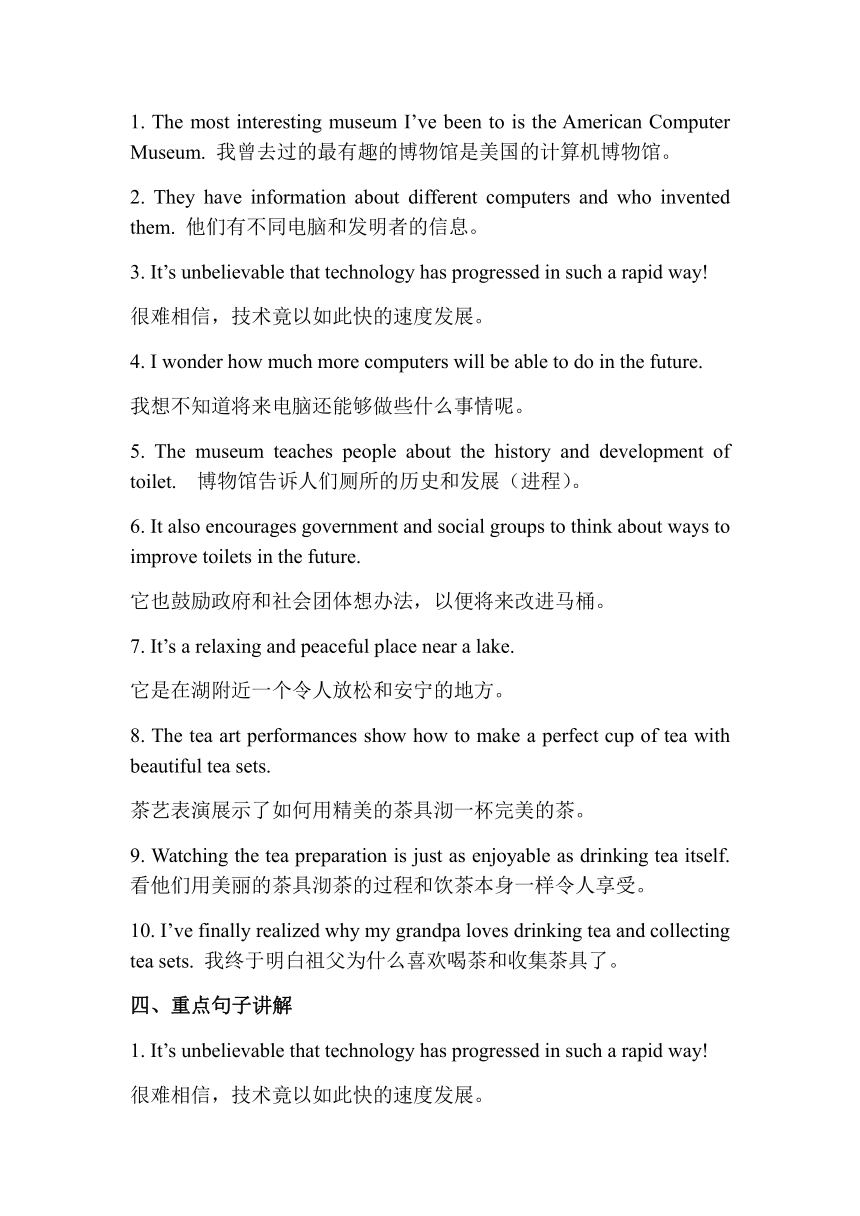2019-2020年学人教版英语八年级下册Unit 9 Have you ever been to a museum?单元复习导学案
文档属性
| 名称 | 2019-2020年学人教版英语八年级下册Unit 9 Have you ever been to a museum?单元复习导学案 |  | |
| 格式 | zip | ||
| 文件大小 | 40.0KB | ||
| 资源类型 | 教案 | ||
| 版本资源 | 人教新目标(Go for it)版 | ||
| 科目 | 英语 | ||
| 更新时间 | 2020-05-20 20:47:09 | ||
图片预览





文档简介
2019-2020年学人教版英语八年级下册
Unit 9:Have you ever been to a museum?
1.本单元主要话题:Have you ever been to a museum?
space museum太空博物馆 history museum历史博物馆 art museum(美术)艺术博物馆 water park水上公园 amusement park游乐场 American Computer Museum美国计算机博物馆 the International Museum of Toilets 国际厕所博物馆 Hangzhou National Tea Museum杭州茶艺博物馆 the Terracotta Army 秦始皇陵兵马俑 the Great Wall长城 the Bird’s Nest鸟巢 the Palace Museum故宫博物馆
2. 本单元主要语法点:现在完成时的意义(2)现在完成时在本单元主要体现在第二个意义的用法:即现在完成时表示一个动作或状态从过去的某一时刻开始,一直延续到现在,并有可能续进行下去。常和以下时间状语连用:recently these days, so far, up till now, in the last/past+一段时间, for +一段时间,since+时间点/一般过去时句子
She has been a volunteer since she realized the importance of environment protection.
They have worked there recently these days.
3. ever和never在现在完成时句子中的意义和用法
ever用于现在完成时的一般疑问句和特殊疑问句中,表示“曾经”
Have you ever been to a museum?
Which book has she ever read?
never用于现在完成时的否定句中,表示“从不,未曾”
I have never been to Water Park.
第一课时:Section A 1a-2d
一、重点短语
space museum太空博物馆 amusement park娱乐公园 water park水上公园 somewhere different 某些不同的地方 the map of sth …的地图 go skating 去滑雪 take the subway 乘火车 go back 回去 learn about 学习关于… put up a tent 搭起帐篷
二、知识点
1. Let sb do sth 让某人做某事
2. It’s a good way to do sth 这是一个做某事的好办法。
三、句子
1. Have you ever been to a museum?---No, I haven’t. Me neither. Me neither=Neither have I.
你去过博物馆吗? —不,我没去过 —我也没去过。
2. Let’s go some where different today. 让我们去某些些不同的地方吧。
3. It’s really interesting, isn’t it? 这真的很有趣,不是吗?
4. It’s a great way to spend a Saturday afternoon.
这是一个度过星期六下午的好办法。
5. I learned about the inventions that led to color movies, too.
我还了解了一些发明,它们成就了彩色电影。
6. We put up a tent and cooked outside.
我们搭了一顶帐篷,在外面做了饭。
7. I’ve never been camping. 我从未野营过。
四、重点句子讲解
1. Have you ever been to a museum?---No, I haven’t. Me neither. 你去过博物馆吗?—不,我没去过—我也没去过。
1)Me neither=Neither have I. 我也是
2)have/has been to sw 表示“曾经去过某地,现在已不在那儿了”主要与ever, twice, before 等词连用;
have/has gone to sw 表示“去了某地还没回来”常与already, just 等词连用。
have/has been in sw 表示在某地呆了多长时间,常与表示一点时间的状语连用。
---Let’s go to the museum, Tom. ---I have been to the museum already.
He has gone to Xi’an for a meeting.
They have been in Shanghai for a week.
2. Let’s go somewhere different today. 让我们去一些不同的地方吧。
Let sb do sth 让某人做某事
somewhere different 一些不同的地方
3. It’s really interesting, isn’t it? 这真的很有趣,不是吗?
反义疑问句是由“陈述句+简单问句”构成。简单句由“be/助动词、情态动词(not)+主语”构成,依据陈述句的位于而定。
They work hard, don’t they?
You didn't go, did you?
1)反义疑问句遵循“前肯后否”或者“前否后肯”的原则;
2)当前面的陈述句中有few, little, never, no, nobody, hardly, seldom等表示否定的词时,后面的疑问句部分应该用肯定;
He can hardly play basketball, can he?
3)以let’s 开头的反义疑问句,疑问部分用shall we;
以Let us开头的疑问句,疑问部分用will you.
Let’s go to movies, shall we? Let us read the book, will you?
4. It’s a great way to spend a Saturday afternoon.
这是一个度过星期六下午的好办法。
It’s a good way to do sth 这是一个做某事的好办法。
5. I learned about the inventions that led to color movies, too. 我还了解了一些发明,它们成就了彩色电影。
此处learn是“了解;获知;得知”的意思,由介词about或of引入所获知的具体内容。
I only learned about the accident later.
我只是后来才得知了事故的情况。
6. I’ve never been camping. 我从未野营过。
此句为现在完成进行时。这一时态的结构为“have been + 现在分词”,表示从过去某一时刻延续至今的动作。在本句中,说话人使用这一时态来强调自己至今从未有过野营的经历。又如:
He’s been watching TV all afternoon. 他一下午都在看电视。
第二课时:Section A 3a-3c
一、重点短语
American Computer Museum美国计算机博物馆 in the future将来 in such a rapid way 以如此快的速度t he International Museum of Toilets 国际厕所博物馆 (with)the development of sth(随着)…的发展 Hangzhou National Tea Museum杭州茶艺博物馆
tea art performance茶艺表演 tea set 茶具
二、知识点
1. It’s unbelievable that+句子,…是很难令人相信的
2. teach sb about sth 教某人某事
3. encourage sb to do sth鼓励某人做某事
4. the ways to do sth = the ways of doing sth 做某事的方法
三、重点句子
1. The most interesting museum I’ve been to is the American Computer Museum. 我曾去过的最有趣的博物馆是美国的计算机博物馆。
2. They have information about different computers and who invented them. 他们有不同电脑和发明者的信息。
3. It’s unbelievable that technology has progressed in such a rapid way!
很难相信,技术竟以如此快的速度发展。
4. I wonder how much more computers will be able to do in the future.
我想不知道将来电脑还能够做些什么事情呢。
5. The museum teaches people about the history and development of toilet. 博物馆告诉人们厕所的历史和发展(进程)。
6. It also encourages government and social groups to think about ways to improve toilets in the future.
它也鼓励政府和社会团体想办法,以便将来改进马桶。
7. It’s a relaxing and peaceful place near a lake.
它是在湖附近一个令人放松和安宁的地方。
8. The tea art performances show how to make a perfect cup of tea with beautiful tea sets.
茶艺表演展示了如何用精美的茶具沏一杯完美的茶。
9. Watching the tea preparation is just as enjoyable as drinking tea itself. 看他们用美丽的茶具沏茶的过程和饮茶本身一样令人享受。
10. I’ve finally realized why my grandpa loves drinking tea and collecting tea sets. 我终于明白祖父为什么喜欢喝茶和收集茶具了。
四、重点句子讲解
1. It’s unbelievable that technology has progressed in such a rapid way!
很难相信,技术竟以如此快的速度发展。
本句是个主从复合句,真正的主语是that后面的从句。
1) It’s unbelievable that+句子,…是很难令人相信的
2) in such a rapid way such+a/an+单数名词 so+adj/adv
2. I wonder how much more computers will be able to do in the future.
我想不知道将来电脑还能够做些什么事情呢。
1) 本句是个宾语从句,所以how much 后面的句子用陈述句语序,即:疑问词+主语+谓语+其它。
2)wonder 表示“ (对某事)感到疑惑;想要知道;想弄明白;后面常接由what, how, who 或者if/whether引导的宾语从句。
e.g. I wonder how they’re getting on. 我想知道他们现在过得怎样。
3. The museum teaches people about the history and development of toilet. 博物馆告诉人们厕所的历史和发展(进程)。
1)teach sb about sth 教(告诉)某人某事
teach sb how to do sth 教某人怎样做某事
teach sb sth 教某人某事
teach sb to do sth 教某人做某事
2) development ,名词,它的动词形式是 develop;
the development of sth …的发展
with the development of sth 随着…的发展
With the development of the society, the lives of people easier and easier.
随着社会的发展,人们的生活越来越容易。
4. It also encourages government and social groups to think about ways to improve toilets in the future. 它也鼓励政府和社会团体想办法,以便将来改进马桶。
1)encourage sb to do sth 鼓励某人做某事 encourage v. 鼓励 encouragement 名词
2)ways to do sth=ways of doing sth 做某事的方法
第三课时:Section A Grammar Focus—4c
一、重点短语
a couple of times几次 walk around the park 在公园散步 hear of sth听说某事 right now 此刻,目前
二、重点句子
1. I’ve already been there a couple of times, but I’m happy to go again.我已经去过那里几次了,但我还是很高兴再次去那里。
2. There are some special German paintings there right now.
目前,那里有一些特殊的德国画。
第四课时:Section B 1a—1d
the Terracotta Army 秦始皇陵兵马俑 the Great Wall长城 the Bird’s Nest鸟巢 the Palace Museum故宫博物馆
第五课时:Section B 2a—2e
一、 重点短语
thousands of数以千计的;成千上万的 on the one hand, on the other hand一方面,另一方面 three quarters of population四分之三的人口 English--speaking country说英语的国家 be asleep睡着 wake up醒来;叫醒 all year round全年,一年到头 be close to和…亲密,靠的近 be far from和…离得远 different kinds of不同种类的
二、知识点
1. It seems +adj+to do sth做某事似乎…
2. It’s the best time to do sth做某事的最好时机
3. one great thing about sth/sb is…某人或某事一个很棒的地方是…
4. choose to do sth选择做某事
5. tell sb to do sth告诉某人做某事
6. weather A or B不管是A还是B;或者A 或者B.
三. 重点句子
1. For thousands of tourists from China, this small is land in Southeast Asia is wonderful and safe place to take a holiday.
对于许多中国游客来说,东南亚的这个小岛是度假的一个极好而且安全的地方。
2. On the one hand, more than three quarters of the population are Chinese, so you can simply speak Putonghua a lot of the time. On the other hand, Singapore is an English-speaking country, so it’s also a good place to practice your English. 一方面,超过四分之三的人口是华人,因此很多时候你可以只讲普通话;另一方面,新加坡是一个说英语的国家,因此,它是你练习英语的好地方。
3. Maybe you fear that you won’t be able to find anything good to eat when you travel. 也许,你担心在你旅行的时候找不到好吃的东西。
4. It might seem strange to go to a zoo when it’s dark.
天黑的时候去动物园看起来很奇怪。
5. …so it’s the best time to watch them.
所以,这是观看它们的最好时间。
6. Whether you like Indian food, Western food or Japanese food, you’ll find it all in Singapore!
无论你是喜欢印度食品,西方食品还是日本食品,你都会在新加坡找到它们。
7. One great thing about Singapore is that the temperature is almost the same all year round.
在新加坡,另一个很棒的事情是,它的温度几乎常年是一样的。
8. You can choose to go wherever you like…
你可以选择去你喜欢的任何地方。
四.重点句子讲解
1. On the one hand, more than three quarters of the population are Chinese, so you can simply speak Putonghua a lot of the time. On the other hand, Singapore is an English-speaking country, so it’s also a good place to practice your English. 一方面,超过四分之三的人口是华人,因此很多时候你可以只讲普通话;另一方面,新加坡是一个说英语的国家,因此,它是你练习英语的好地方。
1)on the one hand… on the other hand 一方面……另一方面……
On?the?one?hand,?she?taught?English,
on?the?other?hand?she?learned?Chinese.??
她一方面教英语,?一方面学习汉语。
2)quarter n. 四分之一;一刻钟 three quarters 四分之三
e.g. I’ve got to go in a quarter of an hour. 一刻钟以后我就得走了。
英语中分数的表示方法: 用“基数词+序数词”表示分数在英语中通常是借助于表达的。其中基数词表示分子,序数词表示分母。分子除用one外,也可用a;如果分子大于1,分母要用复数形式。但是
1/2不能说a(one)second,而要说a(one)half。
1/4和3/4可以说a(one)fourth和three fourths,但常用a quarter和three quarters表示。应该注意的是,若分数修饰的名词在句子中作主语,则谓语动词是用单数还是复数取决于名词,即与分数所修饰的名词保持一致。例如:
About two thirds of the students take part in the meeting.大约2/3的学生都参加了会议。
Three fifths water in the lake is polluted 那个湖里面3/5的水被污染了。
2. It might seem strange to go to a zoo when it’s dark. 天黑的时候去动物园看起来很奇怪。
a) “好像,似乎” , 其后加形容词。e.g. He seems unhappy today.
他今天好像不高兴。
b) seem + (to be) + n. e.g. They seem (to be) doctors.
他们好像是医生。
c) seem + (to be) + 介词
e.g. It seems like years since I last saw her.
自从上次遇到她, 好像已过了许多年。
d) seem to do. My mother seemed to know that.
我妈妈好像知道那件事。
e) It seems that + 从句 e.g. It seems that he is happy.
他好像很快乐。
3. Whether you like Indian food, Western food or Japanese food, you’ll find it all in Singapore! 无论你是喜欢印度食品,西方食品还是日本食品,你都会在新加坡找到它们。
whether为连词,意为“不管…(还是),或者…(或者)引入选择的可能性,引导的句子通常作状语;
Whether she wins or loses, you should give her a chance.
不管她是输是赢,你都应该给她一次机会。
weather A or B 不管是A还是B;或者A 或者B.
4. You can choose to go wherever you like…
你可以选择去你喜欢的任何地方。
1) choose 动词;过去式chose;过去分词chosen;名词choice;
choose sth/sb 选择某人或某物;choose to do sth 选择做某事
2)wherever连词,无论何时,在任何地方;相当于 no matter where;
I believe that the heart will go on wherever you are.
无论什么 whatever= no matter what
无论何时 whenever= no matter what
不管怎样 however= no matter how
同课章节目录
- Unit 1 What's the matter?
- Section A
- Section B
- Unit 2 I'll help to clean up the city parks.
- Section A
- Section B
- Unit 3 Could you please clean your room?
- Section A
- Section B
- Unit 4 Why don't you talk to your parents?
- Section A
- Section B
- Unit 5 What were you doing when the rainstorm came
- Section A
- Section B
- Review of Units 1-5
- Unit 6 An old man tried to move the mountains.
- Section A
- Section B
- Unit 7 What's the highest mountain in the world?
- Section A
- Section B
- Unit 8 Have you read Treasure Island yet?
- Section A
- Section B
- Unit 9 Have you ever been to a museum?
- Section A
- Section B
- Unit 10 I've had this bike for three years.
- Section A
- Section B
